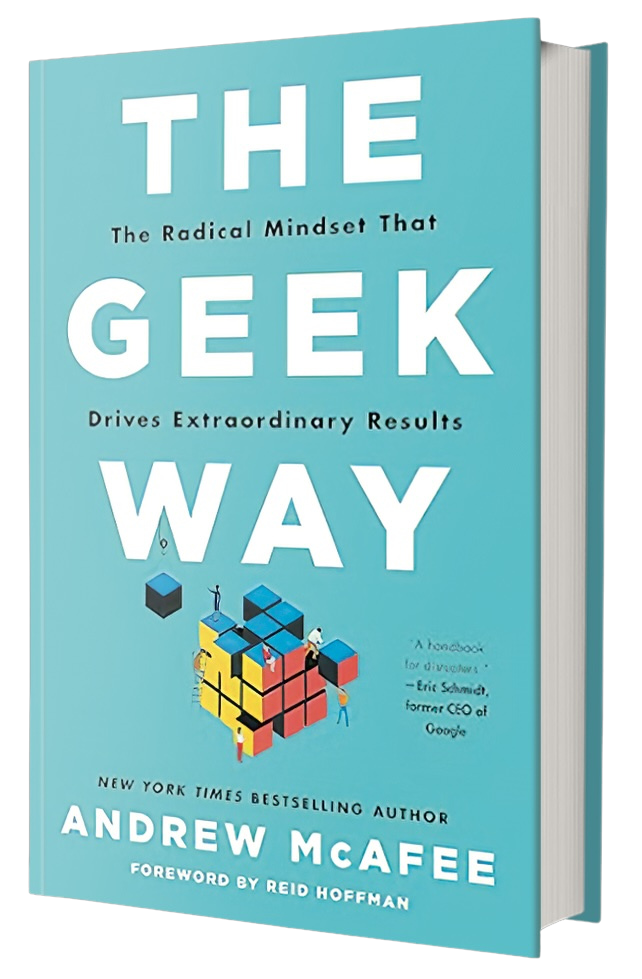Smart people can still do dumb things. That is one of Andrew McAfee’s key points in his latest book, The Geek Way. McAfee is the co-director of the Initiative on the Digital Economy at MIT and principal research scientist at the Sloan School of Management. The Geek Way is McAfee’s first foray into covering organizational management. In it, he deconstructs today’s most successful and innovative companies, from Amazon and Google to Netflix and SpaceX, and explores what lessons the so-called “geeks” who started them can teach anyone looking to build a company. If they manage to keep their egos at bay, these geeks can be stupendously successful. But when hubris wins out, dumb things happen.
The Norms of Geek Companies
“I decided to write this book because I became convinced that a bunch of geeks had figured out a better way to run companies,” McAfee tells Worth. “I wanted to understand it and explain it.” One of the core ways that McAfee organizes his findings is by outlining what he sees as “norms” that are true to every geek-run organization. These norms, per McAfee, are like overarching principles or practices in a company’s culture; however, they aren’t written on a wall or in an employee handbook. They’re just common to all geek-run organizations.

The geek way norms are science, ownership, speed, and openness. How these shake out in any company may be familiar to anyone who has ever worked at a startup or tech firm. But they’re surprisingly not as widespread at all types of organizations or companies, particularly ones that have existed for many years.
By science, McAfee means gathering evidence around a new product or strategy and discussing and arguing about it with others in the organization. He says ownership essentially entails “devolving authority down to an uncomfortable degree and having a fairly atomized organization.” The ownership norm is what developed into AWS (the massive Amazon Web Services cloud platform) for Amazon. “It led to ownership as a leadership principle,” he says. “It was integral in the birth of its participation in the cloud industry to build a modular tech stack so that you can have a modular organization.”
The third norm, speed, encapsulates the idea of minimum viable product or plan and iteration. This is the essence of agile software development models and the “move fast and break things” ethos of so many tech companies, which has spread to everything from entertainment to politics. “Think about Tesla pushing an update to all of its cars in a week versus VW being years late with its electronic vehicle software,” says McAfee.

Leaders Managing Their Egos
The last norm is openness, which facilitates a culture where it’s okay to fail and speak your mind. For leaders, it means the willingness to be wrong, to listen to arguments about a product or direction from subordinates, and to have the flexibility to pivot. In one part of the book, McAfee offers three cases in which Netflix CEO Reed Hastings was willing to be wrong about “gut” decisions and reverse them.
In 2011, Hastings pushed through what turned out to be a disastrous and highly panned spin-off of the DVD-by-mail rental division into a company called Qwikster. In response to the debacle, he instituted official mechanisms that solicited subjective and data-based feedback from other people in the company about any potential new product or initiative launch. The result was that two of Netflix’s most successful initiatives—kids programming and the ability to download content onto devices—went ahead and launched, despite initial reservations by Hastings.
McAfee argues that in addition to exemplifying the geek way norms of openness and science, Hastings and Netflix demonstrate the norms of ownership (the management structure is hands-off and non-hierarchical) and speed (the company has been relentlessly updating new versions of its websites and apps on at least a biweekly basis since 2006).
Yamini Rangan, who took over as CEO of customer relationship software company HubSpot in January 2020, just before the pandemic started, shares her board performance reviews, good and bad, with all her direct reports. She then shares what she plans to do to improve. It’s genuinely walking the walk with a message that says you don’t have to be always winning. And it’s telling that she did it during the pandemic, when it was tough to be truly transparent.
Even established companies can be revamped with geeky principles. As McAfee writes in the book, Satya Nadella has completely transformed Microsoft since being appointed CEO in 2014, not only through strategy but also by changing the culture. While Nadella and Microsoft exhibit all four geek way norms today, McAfee singles out the implementation of ownership in particular as having a profound effect on Microsoft’s success today.
“Geek leaders like Nadella work hard to create very different environments,” writes McAfee. “Doing so entails rejecting a lot of the received wisdom of the industrial era about how important communication, cooperation, and cross-functional coordination are and instead striving to build autonomous and aligned organizations that unconstrain people and give them ownership.” To do this, Nadella got rid of silos. He eliminated P&L (profit and loss) management structures and ownership around different areas such as code, data, and data centers and instead aligned everyone around a common goal for Microsoft. “For the norm of ownership, the ultimate geek ground rule is: To reduce bureaucracy, take away opportunities to gain status that aren’t aligned with the goals and values of the company,” McAfee writes.
Difficult Geek Personalities
Given that many tech companies—and their “geek” leaders—aren’t at the top of any popularity lists right now, it might seem like a strange time to be debuting a geek strategy to build a 21st-century company. But McAfee is careful to separate the norms from the nerds themselves. “I don’t know any person or company that follows every element of the geek way all the time,” he says. “There’s a difference between the four norms of the geek way and what we see in reality. That doesn’t mean that the norms aren’t valuable and powerful. It just means they’re hard to practice universally.”
McAfee cites SpaceX, founded by Elon Musk in 2001, as an example of a geek way success story. In a little over two decades, it has grown into the only company in the world that builds commercially viable, reusable rockets despite having a fraction of competitors’ funding (and a payments entrepreneur founder with zero aerospace experience). SpaceX was superlative in being the only company that could provide hundreds of portable, military-grade, high-speed satellite internet terminals to Ukraine after the Russian invasion—and was recently in talks with Israel to do the same. However, it faced a backlash when Musk threatened to stop providing the free service after enduring everything from Twitter insults to lack of payment.
“The reason he was able to do that is because he’s the CEO of the only company that could deploy that technology,” explains McAfee. “The way you fix that is with competition. Build more than one organization on the face of the planet that could make something like that. Shame on [Elon] for playing ‘general,’ and shame on the rest of the space industry for not being anywhere near able to deploy that capability.”

“The reason he was able to do that is because he’s the CEO of the only company that could deploy that technology,” explains McAfee. “The way you fix that is with competition. Build more than one organization on the face of the planet that could make something like that. Shame on [Elon] for playing ‘general,’ and shame on the rest of the space industry for not being anywhere near able to deploy that capability.”
One of the more high-profile failures that McAfee covers in The Geek Way is the launch of Quibi, a mobile-only streaming platform founded by highly successful Hollywood producer (and Dreamworks co-founder) Jeffrey Katzenberg. He raised $1.75 billion and hired former eBay CEO Meg Whitman to run the platform, which launched in 2021 and lasted only a year. Quibi’s traditional, top-down organization and pricey entertainment industry production and release models, and its leadership’s unwillingness to be open or wrong, doomed it to fail, per McAfee.
“Quibi positioned itself as an Internet-era startup, but it was structured and run like a twentieth-century Hollywood studio,” he writes. “The company was led by an experienced industry insider who made all the most important decisions. At Quibi there were two of these leaders: Katzenberg, who made decisions about content and user experience, and Whitman, who oversaw marketing the service.”
What about Meta’s disastrous, lackluster, and expensive foray into the metaverse over the past four years? (Meta’s Reality Labs division has lost $46.6 billion since 2019, according to the company’s third quarter 2023 earnings report.) Where was the science on that? “Hubris is a thing—a very, very human thing,” says McAfee, “especially if you have had stratospheric success. They stop listening. They stop practicing in the realm/norm of science, which is having an evidence-based egalitarian argument.”
“I think we see that Meta got way overextended on the metaverse,” he continues. “I think we watch that with Elon with whatever we’re supposed to call Twitter now. It’s a very common failure mode. You remember New Coke, right? Have the geeks figured out how to eliminate hubris? No, it’s a very hard thing to eliminate.”










